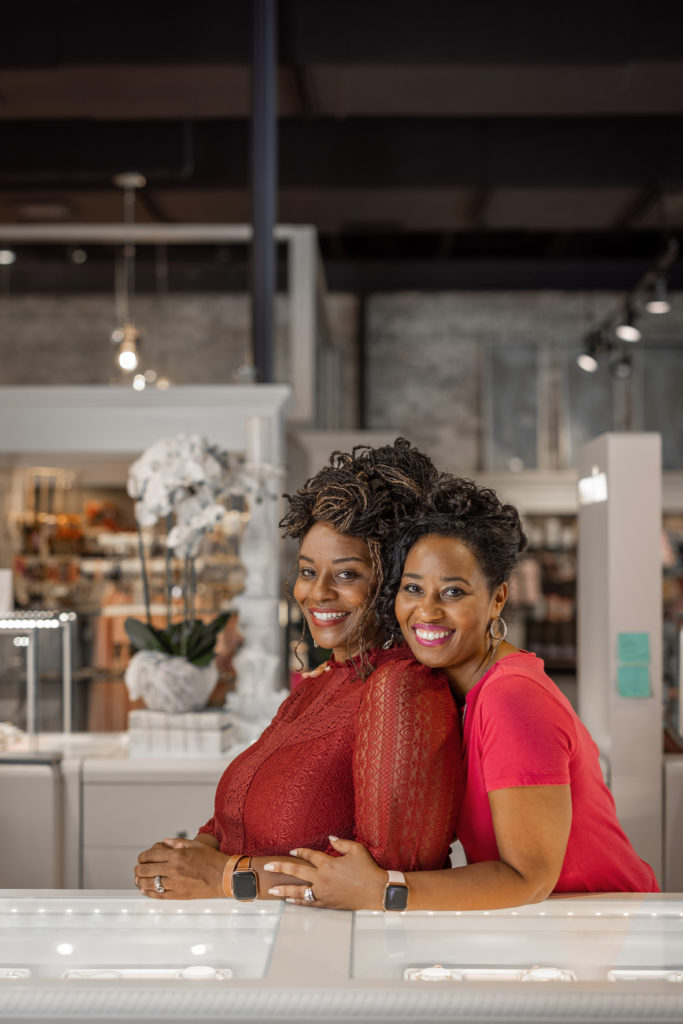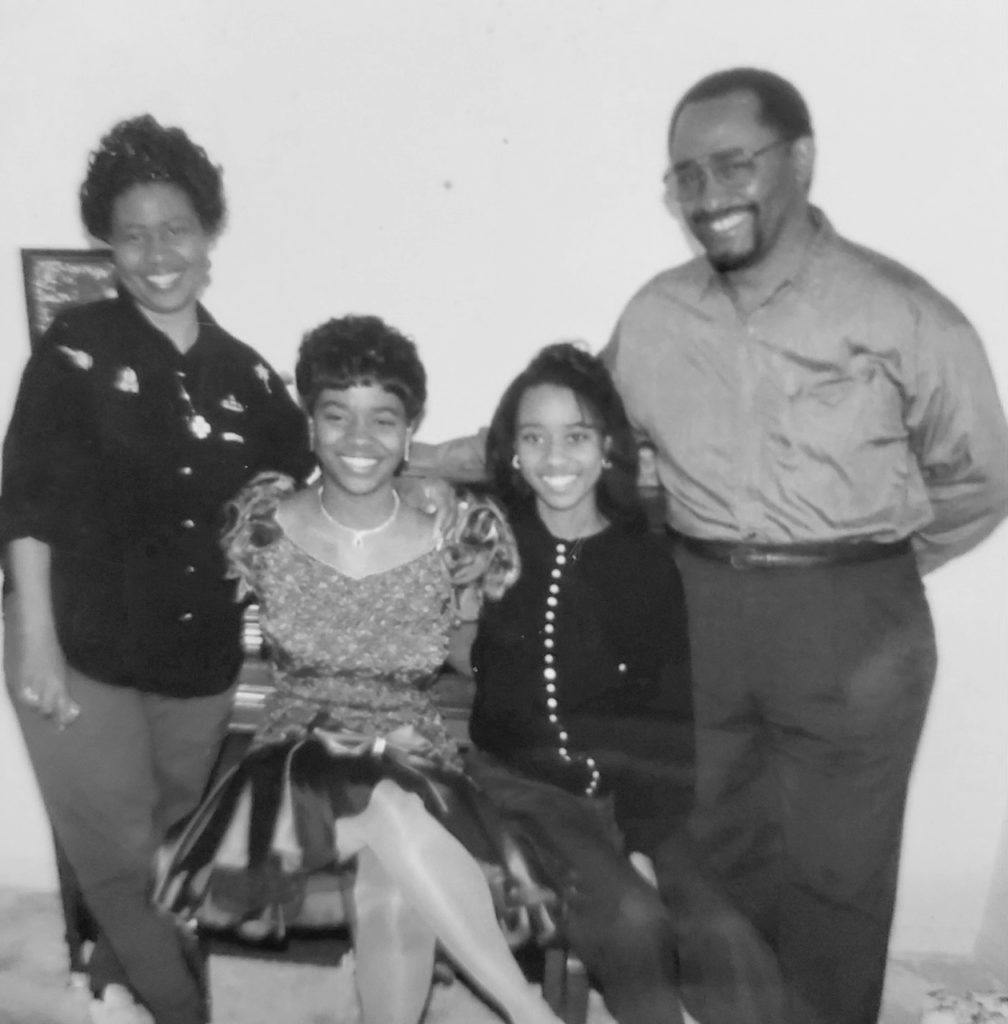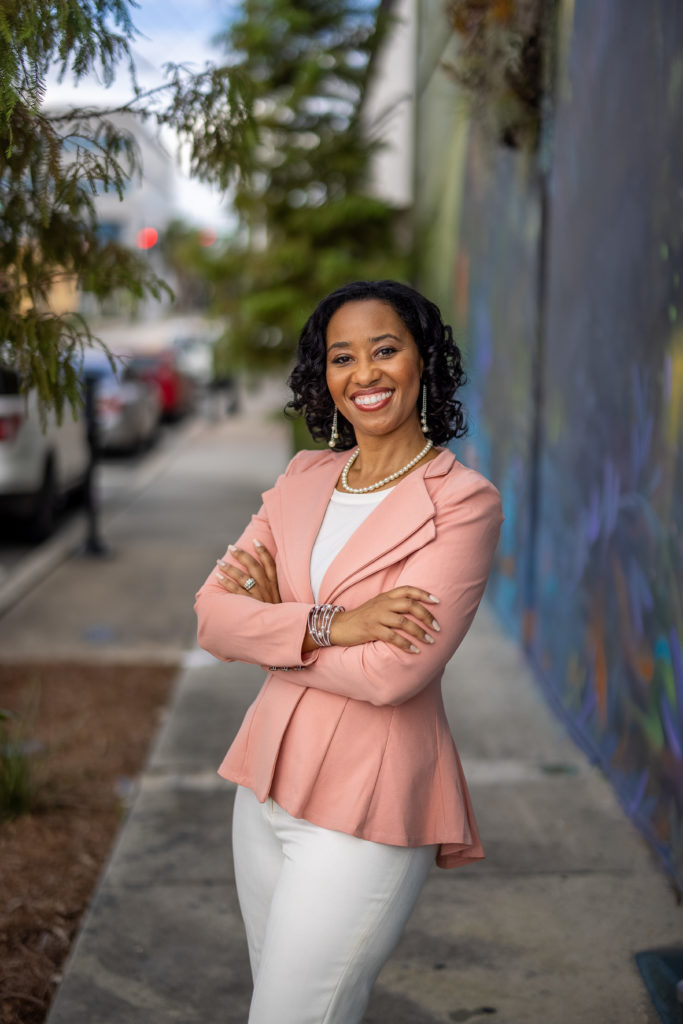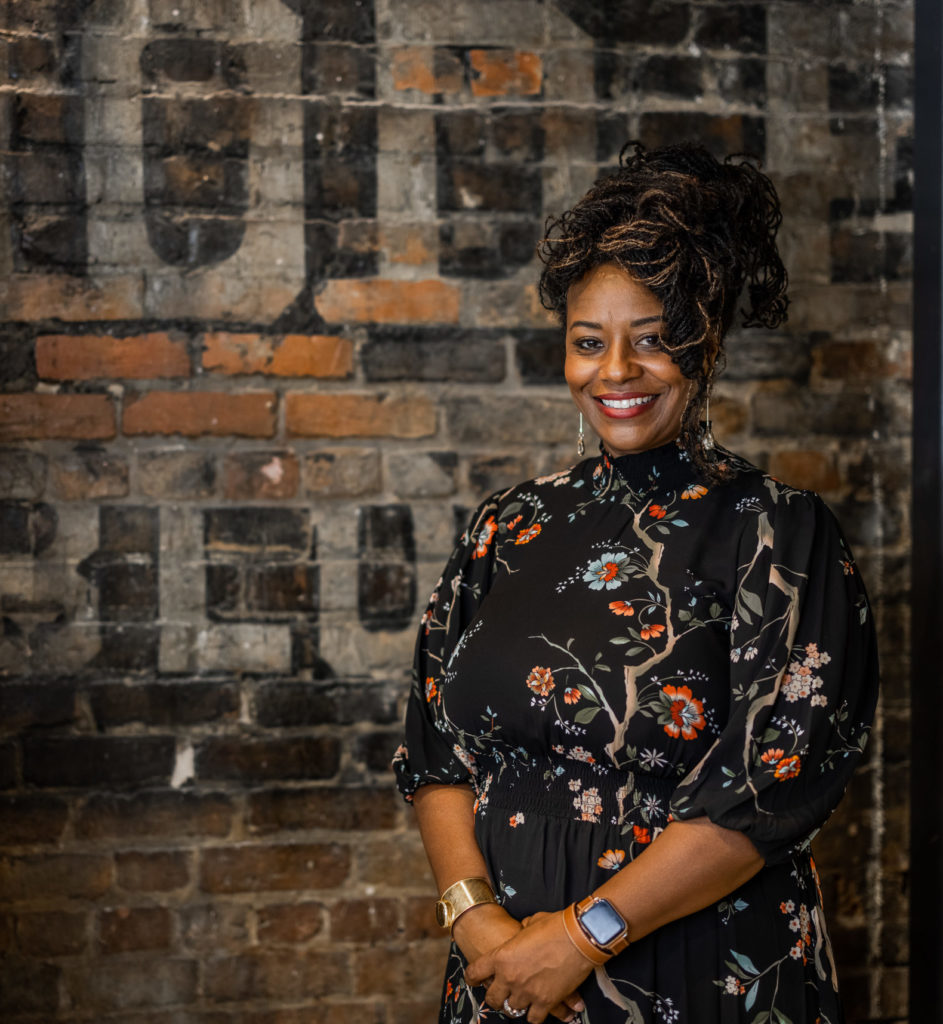Meet two sisters whose shared professional passions led them to become leaders in the pharmaceutical field here in our community.
 What do little girls grow up to be when their dad’s a brainiac? Experts in the science behind medicine. At least that is what biological sisters Drs. Chandra Evans and Sharla Evans Gary did. They fulfilled a career aspiration their father had for himself.
What do little girls grow up to be when their dad’s a brainiac? Experts in the science behind medicine. At least that is what biological sisters Drs. Chandra Evans and Sharla Evans Gary did. They fulfilled a career aspiration their father had for himself.
Born in Fayetteville, North Carolina, the eldest daughters of six siblings recall the pieces of their upbringing that led them to their professions. Their mother Shirley was an educator in the Fayetteville school system for 35 years and their dad, Charles, was a test lab analyst with Goodyear Tire & Rubber Company. Evans and Gary are genetically a mixture of both parents. But when asked about their earliest interest in science, it triggers an immediate reaction that falls solely on their father’s exuberance for life, physics and science.
“Daddy was a family counselor, psychologist, gardener, a disciplinarian,” says Evans. “A jack-of-all-trades. An artist, a mechanic and a musician,” invokes Gary.
They trade looks and smile as they detail his many talents.
Evans, the oldest by 19 months, describes her father as someone who could direct you back home, even if you were lost on the other side of the country. “Dad is a tinker,” she explains.
Gary giggles in agreement, “Yes. Daddy does it all.” She says, “Daddy had a lot of resources and books on everything.”
For a couple of minutes, they converse about how he taught himself to play the saxophone. That was around 2005 and the following year he made his debut at Gary’s wedding.
“Dad’s cerebral,” says Evans, landing on the one description that encompasses him.

The Path to Pharmacy
Both sisters originally considered becoming medical doctors. Evans says her focus was on obstetrics/gynecology.
After taking the Medical College Admission Test, she says, “life happened,” and she never applied to medical school. She was married to an officer in the military at the time and there were no medical schools where they were stationed.
Similarly, Gary thought she would become a pediatrician. It was not until she considered the impact of watching children suffer that she set her sights on pharmacy. Gary had many mentors, including a high school chemistry teacher whose father was a pharmacist. After graduation, Gary started her path toward that same vocation, enrolling at North Carolina Central University (one of the roughly 100 Historically Black Colleges and Universities, or HBCUs, in the United States, which were established by the Civil Rights Act of 1964), where she earned a Bachelor of Science in Chemistry.
During her four years as an undergraduate, Gary worked in the school’s infirmary. That is where she was coached by a Black female pharmacist, Debbie Hardee.
“She was an awesome person,” Gary recalls. “She helped me with my application to pharmacy school and we still communicate.”
Evans cultivated an interest in education prior to pharmacy. After earning a bachelor’s in biology on the pre-medicine track from the University of North Carolina at Greensboro, Evans relished her experiences teaching computer skills to children with intellectual disabilities and working as a high school biology, physical science and math instructor.
“Teaching is really my passion,” she says.
She references the moment this rung true. While pursuing her master’s in biomedical sciences from Fayetteville State University, Evans crossed paths with a chemistry professor from Yale named Dr. Black. After a lengthy conversation with the professor, Evans was inspired to teach on a higher level.
“You may not remember this, but I was looking for a doctoral degree, and you said, why don’t you just try pharmacy?” Evans says to Gary. Though somewhat bewildered, Gary’s smile reveals she is pleased with the outcome.
After that brief conversation, Evans says she took the Pharmacy College Admissions Test and was accepted into the only school to which she had applied. Campbell University’s College of Pharmacy & Health Sciences in North Carolina is also one of the best pharmacy schools in the nation.
Around the same time, Gary was two and a half years into a pharmacy program at another prestigious pharmacy school and HBCU. Gary says she felt homesick and overwhelmed by the size of Florida A&M University’s (FAMU) pharmacy program. So, after completing all her introductory courses, she transferred to Hampton University School of Pharmacy in Virginia, a small, private HBCU.
At Hampton, she appreciated the intimate learning environment. Gary also enjoyed being closer to her Carolina home and her older sister. Although transferring from a large institution to a smaller college was an expensive decision, she reminisces, “The change was perfect.”
Both Gary and Evans graduated with a doctorate in pharmacy in 2006: Gary in May, Evans in December. Gary would return to Florida in 2006 to complete an ambulatory care residency at the Veterans Affairs (VA) Medical Center in Gainesville.

Tough Training
The doctor of pharmacy degree (often abbreviated Pharm.D.) is a post-graduate professional degree that requires six years of education. In 2003, the American Association of Colleges of Pharmacy (AACP) mandated that the entry-level degree would be a Pharm.D. It is similar to a Doctor of Medicine (MD) or Doctor of Dental Surgery (DDS), and thus represents the increasing responsibility pharmacists have in health care systems and the high trust Americans have in pharmacists.
The curriculum and commitment are “not for the faint at heart,” says Evans. “It is not the easiest experience.” Evans further describes the program as tough. “It pushes you to the limit,” she shares.
Gary recalls her classes, including labs, where students made drugs and did physical assessments, as well as pharmacy simulations. Pharmacists also are trained to share a tremendous amount of knowledge with patients. Assessments and counseling on the mechanics of prescriptions are part of the job, such as body excretion, metabolism and “how the medication is distributed in tissues.” Evans’ explanations reveal her instructional slant on pharmacodynamics.
After earning a Pharm.D., students must also pass the North American Pharmacist Licensure Examination and a state law examination in order to engage in professional practice.
Pharmacy Times recently reported “the percentage of non-white licensed pharmacists increased by 46 percent, from 14.9 percent in 2014 to 21.8 percent in 2019. Specifically, the percentage of Black pharmacists more than doubled, from 2.3 percent to 4.9 percent.”
The sisters are not shocked by the uptick. While they posit that the increase in pharmacy schools has created an oversaturation in the field, they still view it is a worthwhile profession. In a gingerly low-country style, the two offer a broader glimpse beyond the white coats seen behind the glass.
“There’s much more to pharmacy,” says Gary. “It’s a portable career. Pharmacists are useful in law, research, academia, economics.”
Gary and Evans expound on the varied avenues beyond retail settings, like Walgreens, that exist for a licensed pharmacist. In fact, Evans is board certified in geriatrics. Through the Board of Pharmacy Specialties (BPS), pharmacists can specialize in areas such as geriatrics, oncology, cardiology, ambulatory care and more. Both sisters agree that attaining certifications, like Evans, or residencies, as Gary did, can separate an average pharmacist from the pack.

Worthy Services
Early on in their careers, both sisters worked in retail pharmacy. Today, Gary and Evans provide services in clinical pharmacy and community pharmacy settings, respectively.
Gary moved to the VA Outpatient Clinic in The Cascades in 2010, where she assists eight to nine primary care providers with disease state management, which includes diabetes, hyperlipidemia, hypertension and smoking cessation. In a clinical setting, she is fortunate to have access to providers, patient records and labs. While she does not dispense medication (the Ocala clinic does not have a dispensing pharmacy), she assists with medication reconciliation and general pharmacy inquiries within the VA scope of practice.
“The main thing is helping them understand what it’s for, how it works and how to take it,” Gary explains. “I enjoy being able to help others better understand health issues and concerns, and really understanding their medications.”
Practically, she works with veterans to regulate blood pressure to healthy levels, keep cholesterol in check and achieve long-range health goals, including advising them on lifestyle changes. As a pharmacist, she is an asset to patients, helping them manage their medications in between visits to their primary physicians. Sometimes that is weekly, biweekly or monthly management.
Since the pandemic began, Gary says the VA has converted to mostly virtual telehealth and telephone appointments. Whether by phone or virtually, Gary feels very optimistic about patients being able to keep their visits.
“I feel honored to serve those who have served us,” declares Gary.
Serving the Community
After a successful career in Ocala, Gary would later convince her sister to move here. Evans says her sister called and said, “Hey. One of my friends is looking for someone to run a pharmacy.” Then, to make the carrot more appetizing, Gary told her, “Don’t worry. I have the perfect house.”
Although that job did not manifest long-term, it did get Evans to Ocala.
Evans now is the Pharmacy Director for the Heart of Florida (HOF), a Federally Qualified Health Center (FQHC), where she was hired to integrate the center by providing a pharmacy, thereby improving patient care.
In May of 2018, Evans says coyly, “I started with a phone and two computer screens.”
While she came to open one pharmacy, she soon had two fully operational pharmacies. The first one was in the health department building on Maricamp Road in November 2018 and the second was on First Avenue. In May 2020, the health department site relocated to the main HOF location on Silver Springs Boulevard. Then the Belleview pharmacy opened in July 2021 and the First Avenue site is now a drive-thru pharmacy on South Pine Avenue. Evans says the process for a relocation is the same as opening a brand-new site, which equates to five pharmacy openings in three years.
Evans admits that, although “serving the underserved, uninsured and underinsured” is demanding, she loves it. “It’s pretty rewarding.”
Each pharmacy is heavily regulated by the Board of Pharmacy and the Drug Enforcement Administration. Pharmacies participating in the 340B Drug Discount Pricing Program in a FQHC are also regulated by the Health Resources and Services Administration.
“Currently, the most rewarding thing is paying it forward with new pharmacists and training them,” Evans says, adding that she enjoys teaching the do’s and don’ts of working with their colleagues and interacting with the public.
Evans oversees all the pharmacists. In the Boulevard location alone, the staff submits claims for an average of almost 300 prescriptions per day.
She stays active in academia, too, serving as a consultant for FAMU’s College of Pharmacy and Pharmaceutical Sciences’ Eminent Scholar Program. Appointed by Dean Johnnie Early, she uses her prowess to enhance the on-campus pharmacy and advises the board of directors.
Despite her workload, Evans added administering COVID-19 vaccines to her list of duties and volunteered in this capacity earlier in the year.
Positional Power
The sisters believe there is an advantage to having the other sister in the same profession, but at different operations. They can discuss different topics pertinent to the other’s practice. And they get to attend conferences to obtain continuing education units together.
“Having a sibling in the same professional career is definitely a blessing and beneficial,” says Gary.
As Black women, the sisters feel compelled to advocate for the best health care practices for all. They further recognize the health disparities among the races and the well documented negative impact of discrimination on individual health on a national level.
“My obligation is to make sure minority patients are not brushed off when it comes to being educated,” states Evans, who is a member of the Minority Women Pharmacists Association. “We are the sickest, the poorest and the first to be dismissed in the health care system as a whole.”
Evans calls on Black health care physicians to fill in the gap. She believes, “in a small community like Marion County, we could lead the charge to shift those stats.”
Gary echoes her sister’s sentiments.
Leading Together
Their unity extends into the community as well. Following in their mother’s footsteps, they are active legacy sorority sisters of Alpha Kappa Alpha Sorority, Incorporated (the first Greek-letter organization established by African American college-educated women). Key tenets of the historic international service organization are to cultivate and encourage high scholastic and ethical standards and also to study and help alleviate problems concerning girls and women.
Notably, beyond their strong familial and professional bonds, the sisters are undeniably powerful examples of women who are paving the way for future generations. Together, they are helping to improve the health care available to two incredibly important populations within our community.
This photo shoot took place on historic Broadway Street and inside Agapanthus Ocala and its Breeze Day Spa. This downtown favorite venue is the former site of one of Ocala’s historic drugstores. In fact, one of the existing exposed brick walls still bears a hand-painted advertisement for a product that was sold there many years ago.
The street also was once home to another drugstore that was operated by Howard Academy-educated Dr. Effie Carrie Mitchell-Hampton, the first Black woman to practice medicine in Florida. She was also one of the founders of the Florida Medical, Dental and Pharmaceutical Association. She later married Dr. Lee Royal Hampton, the first Black dentist in Ocala. This female trailblazer defied restrictions based on her race and gender and used her knowledge and skills to address the problem of inadequate health care in the Black community.






